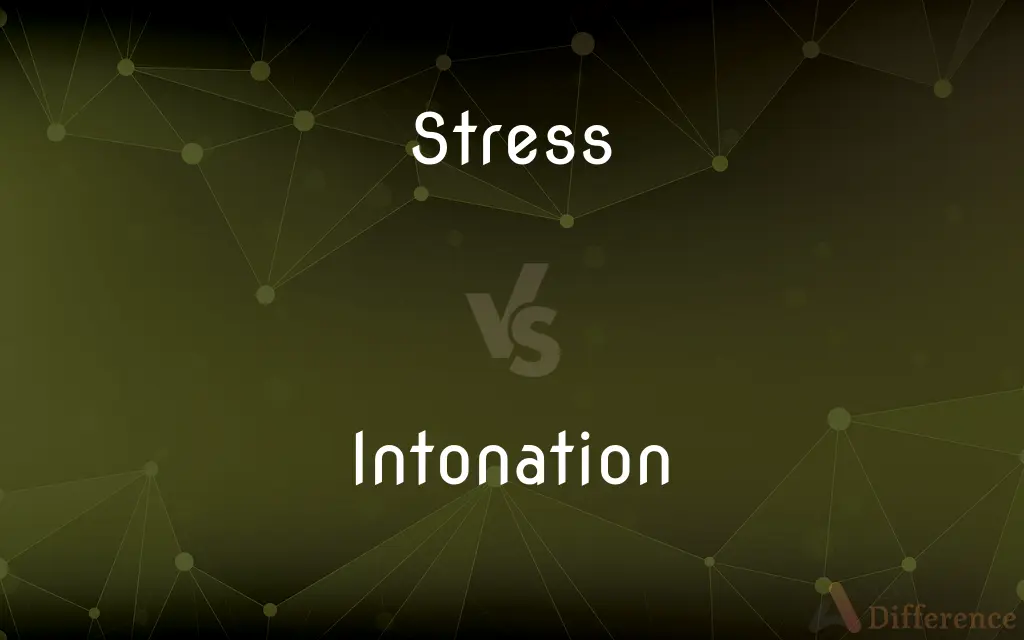Stress vs. Intonation — What's the Difference?
Edited by Tayyaba Rehman — By Fiza Rafique — Updated on March 20, 2024
Stress emphasizes a syllable within a word or phrase, while intonation modifies pitch across sentences for emotional or interrogative cues.

Difference Between Stress and Intonation
Table of Contents
ADVERTISEMENT
Key Differences
Stress in linguistics refers to the emphasis placed on certain syllables within words, affecting the word's pronunciation and sometimes its meaning. This emphasis can distinguish between a noun and a verb, such as in 'record' (noun) vs. 'record' (verb). On the other hand, intonation involves the variation of pitch over phrases and sentences, conveying emotions, questioning, or emphasizing certain information. For example, rising intonation can indicate a question in English.
While stress primarily deals with individual words or specific syllables, giving them prominence and sometimes altering their function or meaning, intonation operates at the level of sentences or phrases. Intonation can indicate whether a sentence is a statement, a question, or an exclamation, among other functions. It plays a key role in the rhythmic aspect of spoken language, contributing to its musicality.
Stress can lead to minimal pairs in English, where the stress placement changes the word's meaning, such as 'import (noun) vs. import (verb). Intonation, however, does not change word meaning but can alter the perceived attitude, emotion, or type of sentence (declarative, interrogative, imperative, etc.).
In terms of learning and teaching, stress patterns can be more predictable and rule-based in some languages, making them somewhat easier to teach and learn. Intonation patterns, however, can be more nuanced and vary widely across different languages and even dialects, often requiring more exposure and practice to master.
Intonation patterns can also be crucial in distinguishing questions from statements in languages like English, where the grammatical structure does not always make this distinction clear. In contrast, stress can help in understanding and producing the correct form of words that have multiple meanings or functions based on their pronunciation.
ADVERTISEMENT
Comparison Chart
Definition
Emphasis on certain syllables within words
Variation of pitch across sentences
Function
Differentiates words, alters meanings
Conveys emotions, questions, emphasis
Level of Application
Word or syllable level
Sentence or phrase level
Impact on Meaning
Can change the meaning of words (e.g., noun vs. verb)
Does not change word meaning, affects sentence meaning
Learning and Teaching
More rule-based, easier to teach
More nuanced, varies widely, requires practice
Compare with Definitions
Stress
Emphasis on specific syllables within words, altering pronunciation and sometimes meaning.
In 'record' as a noun, the stress is on the first syllable, whereas in 'record' as a verb, it's on the second.
Intonation
The variation of pitch in speech, affecting the emotional and interrogative tone of sentences.
Rising intonation at the end of a sentence often indicates a question in English.
Stress
Helps differentiate between words and meanings, especially in minimal pairs.
The stress difference in 'import' (noun) vs. 'import' (verb) is crucial for correct interpretation.
Intonation
Conveys emotional nuances and sentence types (e.g., statements, questions).
A drop in pitch often signals the end of a statement.
Stress
Often follows patterns, making it somewhat predictable and easier to learn.
In English, stress patterns can often be inferred from word suffixes.
Intonation
Requires careful listening and practice, as it involves subtle variations in pitch.
Non-native speakers must learn to hear and reproduce English intonation patterns for effective communication.
Stress
Proper stress is essential for clear and effective communication.
Misplacing stress in 'photograph' and 'photographer' can lead to misunderstandings.
Intonation
Essential for conveying attitudes and emotions, as well as for understanding sentence functions.
The same sentence can express surprise or sarcasm depending on intonation.
Stress
Stress patterns vary significantly across languages, affecting second language acquisition.
Spanish speakers may struggle with English stress patterns due to differences in syllable emphasis.
Intonation
Intonation patterns can vary widely, making them challenging but critical for language learners.
Mandarin Chinese uses tonal variations for word meanings, unlike the emotive or interrogative function in English.
Stress
Pressure or tension exerted on a material object
The distribution of stress is uniform across the bar
Intonation
The act of intoning or chanting.
Stress
A state of mental or emotional strain or tension resulting from adverse or demanding circumstances
He's obviously under a lot of stress
Stress-related illnesses
Intonation
An intoned utterance.
Stress
Physiological disturbance or damage caused to an organism by adverse circumstances
In many areas irrigation is warranted to avoid plant stress
Intonation
A manner of producing or uttering tones, especially with regard to accuracy of pitch.
Stress
Particular emphasis or importance
He has started to lay greater stress on the government's role in industry
Intonation
(Linguistics) The use of changing pitch to convey syntactic information
A questioning intonation.
Stress
Give particular emphasis or importance to (a point, statement, or idea) made in speech or writing
They stressed the need for reform
‘I want it done very, very neatly,’ she stressed
She was anxious to stress that her daughter's safety was her only concern
Intonation
A use of pitch characteristic of a speaker or dialect
"He could hear authority, the old parish intonation coming back into his voice" (Graham Greene).
Stress
Subject to pressure or tension
This type of workout does stress the shoulder and knee joints
Intonation
(Music) The opening phrase of a plainsong composition sung as a solo part.
Stress
Cause mental or emotional strain or tension in
I avoid many of the things that used to stress me before
Intonation
(linguistics) The rise and fall of the voice in speaking.
Stress
Importance, significance, or emphasis placed on something.
Intonation
Emotive stress used to increase the power of delivery in speech.
Stress
The relative force with which a sound or syllable is spoken.
Intonation
A sound made by, or resembling that made by, a musical instrument.
Stress
The emphasis placed on the sound or syllable spoken most forcefully in a word or phrase.
Intonation
Singing or playing in good tune or otherwise.
Her intonation was false.
Stress
The relative force of sound or emphasis given a syllable or word in accordance with a metrical pattern.
Intonation
Reciting in a musical prolonged tone; intonating or singing of the opening phrase of a plain-chant, psalm, or canticle by a single voice, as of a priest.
Stress
A syllable having strong relative emphasis in a metrical pattern.
Intonation
A thundering; thunder.
Stress
An accent or mark representing such emphasis or force.
Intonation
The act of sounding the tones of the musical scale.
Stress
The internal distribution of force per unit area within a body subject to an applied force or system of forces.
Intonation
The manner of speaking, especially the placement of emphasis, the cadence, and the rise and fall of the pitch of the voice while speaking.
Stress
The internal resistance of a body to such an applied force or system of forces.
Intonation
Rise and fall of the voice pitch
Stress
A condition of extreme difficulty, pressure, or strain
"He presided over the economy during the period of its greatest stress and danger" (Robert J. Samuelson).
Intonation
Singing by a soloist of the opening piece of plainsong
Stress
A stimulus or circumstance causing such a condition
Couldn't stand the stresses of the job and quit.
Intonation
The act of singing in a monotonous tone
Stress
To place emphasis on
Stressed basic fire safety in her talk.
Intonation
The production of musical tones (by voice or instrument); especially the exactitude of the pitch relations
Stress
To give prominence of sound to (a syllable or word) in pronouncing or in accordance with a metrical pattern.
Stress
(Informal) To subject to physiological or mental stress or strain. Often used with out
The pressure of the deadline is really stressing me out.
Stress
To subject to mechanical pressure or force.
Stress
To undergo physiological or mental stress, as from working too much. Often used with out.
Stress
(biology) A physical, chemical, infective agent aggressing an organism.
Stress
(biology) Aggression toward an organism resulting in a response in an attempt to restore previous conditions.
Stress
The internal distribution of force across a small boundary per unit area of that boundary (pressure) within a body. It causes strain or deformation and is typically symbolised by σ or τ.
Stress
Force externally applied to a body which cause internal stress within the body.
Stress
(uncountable) Emotional pressure suffered by a human being or other animal.
Go easy on him, he's been under a lot of stress lately.
Stress
A suprasegmental feature of a language having additional attention raised to a sound, word or word group by means of of loudness, duration or pitch; phonological prominence.
Some people put the stress on the first syllable of “controversy”; others put it on the second.
Stress
The suprasegmental feature of a language having additional attention raised to a sound by means of of loudness and/or duration; phonological prominence phonetically achieved by means of dynamics as distinct from pitch.
Stress
(uncountable) Emphasis placed on a particular point in an argument or discussion (whether spoken or written).
Stress
Obsolete form of distress
Stress
Distress; the act of distraining; also, the thing distrained.
Stress
(transitive) To apply force to (a body or structure) causing strain.
Stress
(transitive) To apply emotional pressure to (a person or animal).
Stress
To suffer stress; to worry or be agitated.
Stress
(transitive) To emphasise (a syllable of a word).
“Emphasis” is stressed on the first syllable, but “emphatic” is stressed on the second.
Stress
(transitive) To emphasise (words in speaking).
Stress
(transitive) To emphasise (a point) in an argument or discussion.
I must stress that this information is given in strict confidence.
Stress
Distress.
Sad hersal of his heavy stress.
Stress
Pressure, strain; - used chiefly of immaterial things; except in mechanics; hence, urgency; importance; weight; significance.
The faculties of the mind are improved by exercise, yet they must not be put to a stress beyond their strength.
A body may as well lay too little as too much stress upon a dream.
Stress
The force, or combination of forces, which produces a strain; force exerted in any direction or manner between contiguous bodies, or parts of bodies, and taking specific names according to its direction, or mode of action, as thrust or pressure, pull or tension, shear or tangential stress.
Stress is the mutual action between portions of matter.
Stress
Force of utterance expended upon words or syllables. Stress is in English the chief element in accent and is one of the most important in emphasis. See Guide to pronunciation, 31-35.
Stress
Distress; the act of distraining; also, the thing distrained.
Stress
To press; to urge; to distress; to put to difficulties.
Stress
To subject to stress, pressure, or strain.
Stress
To subject to phonetic stress; to accent.
Stress
To place emphasis on; to make emphatic; emphasize.
Stress
The relative prominence of a syllable or musical note (especially with regard to stress or pitch);
He put the stress on the wrong syllable
Stress
(psychology) a state of mental or emotional strain or suspense;
He suffered from fatigue and emotional tension
Stress is a vasoconstrictor
Stress
(physics) force that produces strain on a physical body;
The intensity of stress is expressed in units of force divided by units of area
Stress
Special emphasis attached to something;
The stress was more on accuracy than on speed
Stress
Difficulty that causes worry or emotional tension;
She endured the stresses and strains of life
He presided over the economy during the period of the greatest stress and danger
Stress
To stress, single out as important;
Dr. Jones emphasizes exercise in addition to a change in diet
Stress
Put stress on; utter with an accent;
In Farsi, you accent the last syllable of each word
Stress
Test the limits of;
You are trying my patience!
Common Curiosities
How does intonation differ from stress?
Intonation involves pitch variations across phrases and sentences to convey emotions or questions, unlike stress, which focuses on syllables within words.
What is stress in linguistics?
Stress is the emphasis placed on certain syllables within words, affecting pronunciation and sometimes the word's meaning.
Is intonation important for understanding emotions in speech?
Absolutely, intonation is crucial for conveying and understanding emotions, attitudes, and sentence functions like questions or exclamations in spoken language.
Are there rules for stress patterns in English?
English has some predictable stress patterns, often related to word suffixes or word types, but there are exceptions.
Can intonation patterns be learned?
Yes, intonation patterns can be learned through careful listening and practice, though they can be subtle and complex.
Do all languages use stress in the same way?
No, languages use stress differently. Some languages have fixed stress patterns, while others may vary, impacting second language learning.
Can stress change the meaning of a word?
Yes, stress can change a word's meaning, especially in minimal pairs where the stress placement alters the word's function or meaning.
Is intonation always the same for questions in English?
Generally, questions in English often end with a rising intonation, but there are variations depending on the type of question and the speaker's intention.
How do stress and intonation contribute to language rhythm?
Stress and intonation contribute to the rhythmic and musical aspects of language, with stress providing a beat and intonation adding melodic contours.
How does intonation affect sentence meaning?
Intonation can change the perceived meaning of a sentence, such as turning a statement into a question or expressing sarcasm or surprise.
Does incorrect stress placement affect communication?
Incorrect stress placement can lead to misunderstandings, especially in cases of minimal pairs or when it alters the intended meaning.
Do some languages not use stress or intonation?
All languages use some form of stress and intonation, but the specifics of how they are used and their importance can vary greatly.
Can stress patterns vary within a language?
Yes, stress patterns can vary due to regional accents or dialects within the same language.
Why is intonation challenging for language learners?
Intonation involves nuanced pitch variations and can differ significantly across languages, making it challenging but essential for effective communication.
Share Your Discovery

Previous Comparison
Albeit vs. Although
Next Comparison
Midnight vs. NoonAuthor Spotlight
Written by
Fiza RafiqueFiza Rafique is a skilled content writer at AskDifference.com, where she meticulously refines and enhances written pieces. Drawing from her vast editorial expertise, Fiza ensures clarity, accuracy, and precision in every article. Passionate about language, she continually seeks to elevate the quality of content for readers worldwide.
Edited by
Tayyaba RehmanTayyaba Rehman is a distinguished writer, currently serving as a primary contributor to askdifference.com. As a researcher in semantics and etymology, Tayyaba's passion for the complexity of languages and their distinctions has found a perfect home on the platform. Tayyaba delves into the intricacies of language, distinguishing between commonly confused words and phrases, thereby providing clarity for readers worldwide.















































